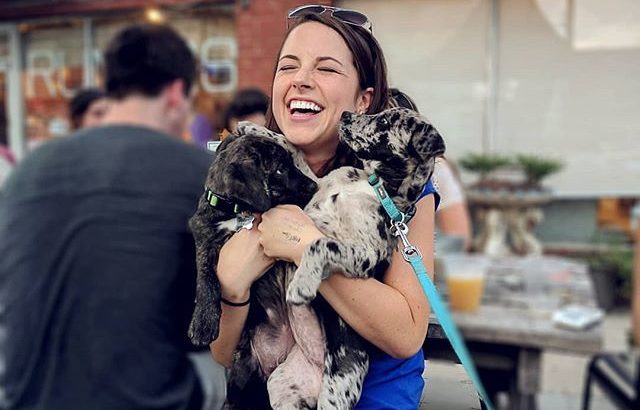Podcast: Play in new window | Download
Subscribe: Spotify | Email | TuneIn | RSS
After a tough day of negative results and an ornery PI, it can be nice to come home to someone who thinks you’re amazing, loves you unconditionally, and wants nothing more than to cuddle with you on the couch.
Of course, we’re talking about pets; dogs, cats, gerbils, rabbits, birds, horses and, I’m told, snakes and reptiles, can brighten even the darkest day.
But despite their well-known restorative powers, pets can be a lot of work. Does a grad student or postdoc really have time to take care of another creature?
This week, we assess the pros, and cons, of caring for pets in grad school.
Woof, Meow, Tweet
Susannah Harris was a fourth-year graduate student when she noticed a post on facebook about two stray puppies.
“These were the cutest, and saddest puppies you’ve ever seen,” she remembers. As a long-time pet owner, she had thought about adopting a dog, but wasn’t sure how they’d fit into her busy research schedule.
She set up a time to meet the puppies and to assess the option of adopting them. But, she also set up a veterinarian appointment for the very next day.
In other words, there was NO WAY she was coming home without puppies.
As strays, Hermes and Athena needed some serious care in the early days, but Susannah took it one day at a time. It wasn’t long before her care for the pups started to teach her about caring for herself.
“There’s something really amazing about taking care of something else that is fully dependent on you, that reminds you YOU are fully dependent on you. You need to take care of yourself.”
That can be difficult in graduate school, where long hours in the lab are both an expectation and a badge of honor.
“People were more worried that my dogs weren’t getting enough attention or time outside, than they were for me.”
Susannah’s dogs helped her to see that just as they needed time, attention and care, so did she.
She says that as a grad student, “we put these things on hold because we can, but you would never say that about your dog. You would never treat a pet like that.”
Though having a pet in graduate school can be a real comfort, it is not without its challenges.
“It is WAY more expensive than you realize,” Susannah observes. And if you work long hours or need to travel for conferences, you’ll need to recruit helpers that can care for your pet in your absence.
Susannah has taken to asking friends or colleagues for help.
“Everyone in grad school secretly wants a pet. There’s always someone willing to help if you ask them.”
We also asked our friends on Twitter whether they thought it was a good idea to foster a pet in graduate school. The response was overwhelming!
Pets are really important during grad school. Free cuddles. Nonjudgmental. Needs you. Loves you. That baseline level of responsibility that also ensures you take care of you, cause you have to in order to take care of them.
— Anna Scharnagl (@AnnaScharnagl) November 25, 2018
Sure if you want a resilliance building experience, a permanent narcissistic co-author that insists on editing your work with nonsense feedback and constantly rejects you.. Definitely get a cat in gradschool! (this is Bean I love her to bits but she gives zero sh#!%!) 😂 pic.twitter.com/scaO6W1tTR
— Nicole Hill (@NicoleTMHill) November 25, 2018
I have cats, dogs, and horses(not going to admit how many on here). The happiness that they give me outweighs all the cons! pic.twitter.com/STLKkzt27X
— Bridgett Downs Benedict (@bridgettttbd) November 26, 2018
On this week’s show, we share the ups, downs, and sideways (can you say ‘explosive diarrhea?’) of owning a pet. If you’re thinking of adopting, or have a furry or feathery friend already, let us know in the comments!
Who’s a good boy?
It’s not all fun and games this week, we also hit the stacks.
Josh shares some research on how dogs interpret human speech. It turns out that our canine companions don’t want to hear about your workout any more than your human friends do!
And we support our canine and feline friends by sipping the Aji Dulce Cider from Dingo Dog Brewing Company in Carrboro, NC. Dingo Dog is a nano-brewery that uses its profits to fund no-kill animal shelters, and the Aji Dulce Cider combines apples with the flavor of sweet peppers!
With just 60 bottles in circulation, you’ll have a tough time finding this brew on store shelves, but don’t let that stop you from looking for your OWN nanobrew creations!
For helpful tools on purification, amplification, ligation and cloning, check out the Molecular Biology Essentials page from Promega. Visit www.promega.com/phdessentials

One thought to “110: The Secret Life of Pets (in Grad School)”